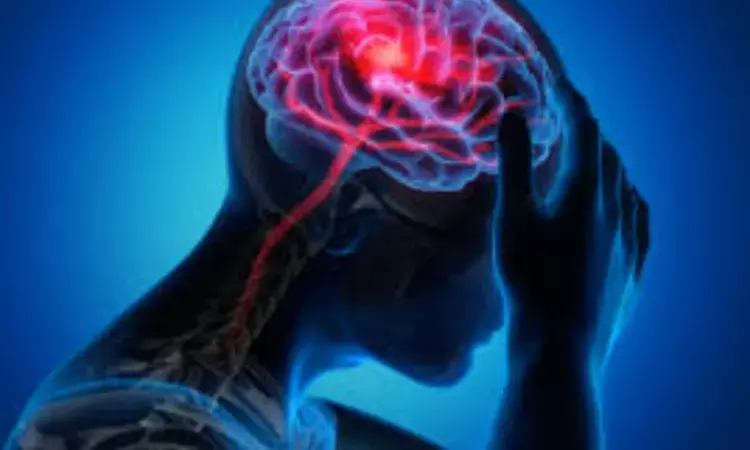- Home
- Medical news & Guidelines
- Anesthesiology
- Cardiology and CTVS
- Critical Care
- Dentistry
- Dermatology
- Diabetes and Endocrinology
- ENT
- Gastroenterology
- Medicine
- Nephrology
- Neurology
- Obstretics-Gynaecology
- Oncology
- Ophthalmology
- Orthopaedics
- Pediatrics-Neonatology
- Psychiatry
- Pulmonology
- Radiology
- Surgery
- Urology
- Laboratory Medicine
- Diet
- Nursing
- Paramedical
- Physiotherapy
- Health news
- Fact Check
- Bone Health Fact Check
- Brain Health Fact Check
- Cancer Related Fact Check
- Child Care Fact Check
- Dental and oral health fact check
- Diabetes and metabolic health fact check
- Diet and Nutrition Fact Check
- Eye and ENT Care Fact Check
- Fitness fact check
- Gut health fact check
- Heart health fact check
- Kidney health fact check
- Medical education fact check
- Men's health fact check
- Respiratory fact check
- Skin and hair care fact check
- Vaccine and Immunization fact check
- Women's health fact check
- AYUSH
- State News
- Andaman and Nicobar Islands
- Andhra Pradesh
- Arunachal Pradesh
- Assam
- Bihar
- Chandigarh
- Chattisgarh
- Dadra and Nagar Haveli
- Daman and Diu
- Delhi
- Goa
- Gujarat
- Haryana
- Himachal Pradesh
- Jammu & Kashmir
- Jharkhand
- Karnataka
- Kerala
- Ladakh
- Lakshadweep
- Madhya Pradesh
- Maharashtra
- Manipur
- Meghalaya
- Mizoram
- Nagaland
- Odisha
- Puducherry
- Punjab
- Rajasthan
- Sikkim
- Tamil Nadu
- Telangana
- Tripura
- Uttar Pradesh
- Uttrakhand
- West Bengal
- Medical Education
- Industry
Daprodustat Treatment for Renal Anemia associated with ischemic stroke: Insights from Three Cases

Japan: In a recent report published in Cureus Journal, three cases of ischemic stroke occurring in patients undergoing daprodustat therapy for renal anemia have raised significant concerns among healthcare professionals.
Daprodustat, a medication FDA-approved for treating anemia in chronic kidney disease (CKD) patients, is known for stimulating erythropoiesis by inhibiting the hypoxia-inducible factor prolyl hydroxylase enzyme. While generally considered safe, these cases highlight potential neurological risks associated with the therapy.
Therefore, the researchers suggest discontinuing daprodustat to reduce the risk of recurrent ischemic strokes.
Hypoxia-inducible factor prolyl hydroxylase (HIF-PH) inhibitors are being increasingly utilized for treating renal anemia. While ischemic stroke is a rare but serious adverse event associated with HIF-PH inhibitor therapy, its clinical characteristics have not yet been documented.
In the study, Naohiro Uchio, Department of Neurology, Mitsui Memorial Hospital, Tokyo, Japan, and colleagues present three patients who experienced ischemic strokes while undergoing daprodustat therapy.
In two cases, hemoglobin levels surpassed the target of 13 g/dL for renal anemia (Cases 1 and 2). Notably, two patients suffered strokes within two months of starting daprodustat (Cases 2 and 3). One patient, despite being on dual antiplatelet therapy, also experienced an ischemic stroke (Case 3). Fortunately, none of the patients had a recurrence, likely due to the cessation of daprodustat treatment. This leads to the suggestion that daprodustat therapy may significantly contribute to the risk of developing ischemic strokes.
Commenting on the mechanism behind these occurrences, the authors noted that the exact causes of thromboembolism associated with HIF-PH inhibitor therapy remain unclear. However, it is believed that HIF-PH inhibitors have multiple effects, particularly their role in promoting erythropoiesis.
"These inhibitors stimulate the transcription of the erythropoietin gene, which can trigger hypoxia-induced responses leading to increased red blood cell production. Consequently, the erythropoietic effects of HIF-PH inhibitor therapy are thought to contribute to thromboembolism. Currently, only a limited number of risk factors have been identified, including excessive or rapid increases in hemoglobin levels and iron deficiency," the researchers wrote.
The findings revealed that the occurrence of ischemic stroke poses a significant challenge in managing patients on daprodustat therapy for renal anemia, as highlighted by the authors.
"Such strokes may arise during periods of excessive hemoglobin elevation exceeding 13 g/dL or within the first two months following daprodustat initiation, likely due to heightened erythropoietic stimulation. Therefore, upon the onset of an ischemic stroke, it is crucial to discontinue daprodustat to prevent recurrence and prioritize patient safety," the authors concluded.
Reference:
Uchio N, Komaki S, Hao, et al. (April 10, 2024) Ischemic Stroke During Daprodustat Therapy for Renal Anemia: A Report of Three Cases. Cureus 16(4): e57990. doi:10.7759/cureus.57990
Dr Kamal Kant Kohli-MBBS, DTCD- a chest specialist with more than 30 years of practice and a flair for writing clinical articles, Dr Kamal Kant Kohli joined Medical Dialogues as a Chief Editor of Medical News. Besides writing articles, as an editor, he proofreads and verifies all the medical content published on Medical Dialogues including those coming from journals, studies,medical conferences,guidelines etc. Email: drkohli@medicaldialogues.in. Contact no. 011-43720751


